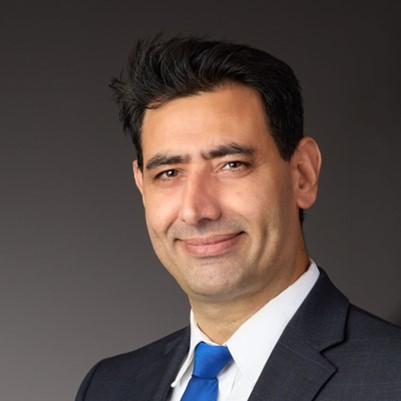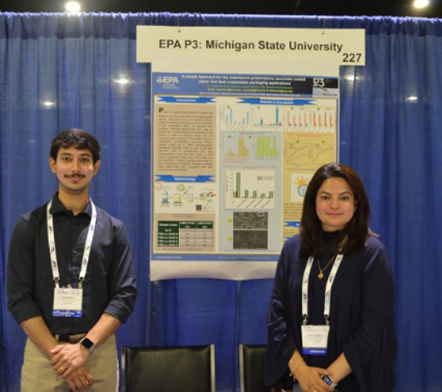Team of MSU researchers awarded EPA grant to further sustainable packaging initiative
A team of researchers at MSU's School of Packaging has received research funding from the Environmental Protection Agency to produce environmentally low-impact packaging solutions as alternatives to non-biodegradable and single-use options.

A team of researchers at Michigan State University’s (MSU) School of Packaging has received research funding from the Environmental Protection Agency (EPA) to produce environmentally low-impact packaging solutions as alternatives to non-biodegradable and single-use options.
The grant falls under EPA’s People, Prosperity and the Planet (P3) Program and funds Phase II of the 18th Annual P3 competition. The P3 Program supports the research, development, design and demonstration of solutions that respond to environmental and human health protection needs while enhancing quality of life, economic prosperity and planet protection. Awardees previously received a one-year grant for Phase I to support the validation of their idea. Phase II will allow research teams to develop the technology suitable for real-world packaging applications.
The project, titled “Elimination of Microplastics and Per- and Polyfluroalkyl Substances (PFAS) Problems Upon the Disposal of Single-Use Packaging,” aims to develop water- and oil-resistant coated paper as a low-impact, commercially and economically viable packaging solution.
PFAS, often called ‘forever chemicals,’ are manufactured chemicals used in various industry and consumer products. These chemicals break down very slowly and often build up in humans, animals and the environment over time, posing severe risks to human and environmental health. The prevalence of PFAS in coating for food packaging materials, particularly utilized in wrappers and molded fiber takeout containers for their desirable water and oil resistance, is a significant contributor to the accumulation of PFAS in human bodies, which has been linked to severe health issues, including immune system disorders and cancer.
By creating a safe, biodegradable alternative for conventional plastics and PFAS-coated materials, the project addresses an urgent need to reduce the overall release of microplastics and PFAS into the environment. This initiative also creates a viable end-of-life solution for related waste, with the potential to significantly improve human health and environmental conditions.

Muhammad Rabnawaz, Ph.D., an associate professor and CANR faculty laureate in the School of Packaging, leads a diverse team of student researchers from the MSU School of Packaging’s Sustainable Materials Group. The group focuses on renewable, biodegradable and recyclable packaging materials with minimal environmental footprints, aiming to develop technically feasible and environmentally responsible packaging solutions.
The project not only aims to reduce the environmental harm caused by non-biodegradable and single-use packaging but also has potential economic benefits.
“Given the harmful effects of PFAS and threats from microplastics, finding alternatives is crucial,” said Rabnawaz. “This research hopes to address current environmental issues by reducing ocean microplastics and diminishing PFAS pollution from single-use packaging. Moreover, this innovation could help improve public health, protect biodiversity and enhance soil and air quality. Additionally, it promises to stimulate economic growth and job creation in the U.S. by introducing novel, sustainable alternatives to traditional packaging materials.”
Phase I of the project successfully developed a fully biodegradable, PFAS-free coated paper with good water and oil resistance for sustainable packaging applications. Phase II will focus on minimizing material use to meet industry standards while maintaining effectiveness and optimizing production costs to compete with contemporary packaging materials. The goal is for the coated paper to be used in packaging applications like food wrappers, plates and cups, with the ability to expand the technology to include other products such as straws and water-resistant boxes.

Syeda Hamdani is a research scholar engaged in developing sustainable paper coatings and assessing the properties of the developed products. Initially attracted to the project for its potential global impact, Hamdani recognizes its benefit in advancing public health while teaching critical lessons to student researchers.
“This project benefits the public by addressing real-world issues related to microplastics and PFAS. The alternatives will be a greener, safer gift to the planet,” said Hamdani. “Furthermore, students and researchers participating in this initiative, working on real-world problems, will not only develop experimental abilities but also improve their critical thinking and problem-solving skills. This initiative, which is critical in preparing the next generation, will help develop outstanding thinkers ready to make a difference in the world.”
Dhawal Sonar, a master’s student in the School of Packaging, is another researcher involved in synthesizing coatings and evaluating their application on paper. A packaging engineer committed to a sustainable future, Sonar acknowledges the critical need to advance these solutions to commercial implementation. He hopes industry professionals recognize the problems with current practices and commit to implementing greener packaging alternatives.
“The world is aware of the negative effects of microplastics and PFAS, yet traditional packaging solutions continue to be used due to their low cost until low-cost solutions are available,” said Sonar. “The public has every right to a clean, pollution-free environment, and this project has the potential to help provide that. Developing sustainable alternatives is not enough; the industrial sector must adopt these measures for real-world applications to make a meaningful impact.”
As the project advances, Rabnawaz recognizes the collaborations at the heart of this unique project.
“I want to acknowledge the EPA for their sponsorship of research critical to issues we are currently facing. I also want to acknowledge MSU and the School of Packaging, which are leaders in solving global packaging issues; their platforms give us a lot of opportunities and visibility to conduct impactful projects like this. This work would not be possible without the School of Packaging and the support of sponsors that help us continue advancing research addressing important issues.”



 Print
Print Email
Email

